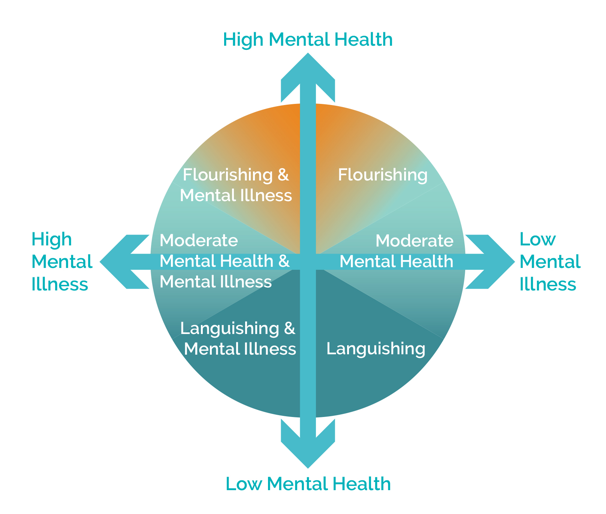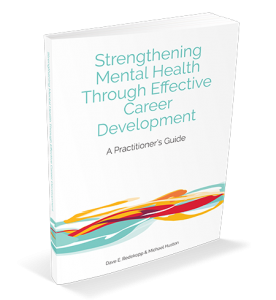Mental health and mental illness are distinct entities, and knowing about and understanding this difference allows career development practitioners to better conceptualize and practice a dimension of mental health awareness in their work. In this post, we show that this understanding will help you see that your career development practice is also mental health practice.
Our book (Strengthening Mental Health through Effective Career Development) launched earlier this year at the Cannexus conference in Ottawa. The book came about as a result of consultation with career development practitioners in Canada and Australia. One of our key learnings along the way relates specifically to understanding the importance of how mental health and mental illness are different.
What is mental health and what is mental illness?
“Mental health” is popularly understood to have the same meaning as “mental illness.” We all tend to think mental illness when we hear the words mental health. In proper use – and especially for our purpose here – the terms have unique meanings.
Mental health is defined in positive ways rather than as the absence of mental illness:
-
Visit ceric.ca/cdmh to download a free pdf of the book or for information about how to purchase a print copy. “… the capacity of each and all of us to feel, think, act in ways that enhance our ability to enjoy life and deal with the challenges we face. It is a positive sense of emotional and spiritual well-being that respects the importance of culture, equity, social justice, interconnections and personal dignity.” (Public Health Agency of Canada, 2014)
- “… a state of well-being in which every individual realizes his or her own potential, can cope with the normal stresses of life, can work productively and fruitfully, and is able to make a contribution to her or his community.” (World Health Organization, 2019)
On the other side, mental illness is defined and characterized as a disorder that potentially interferes with an individual’s capacity to function and cope with demands; it is not the absence of mental health:
- “[a] mental illness is a clinically diagnosable disorder that significantly interferes with an individual’s cognitive, emotional or social abilities.” (Australian Government Department of Health, 2008)
- “Mental illnesses are characterized by alterations in thinking, mood or behaviour associated with significant distress and impaired functioning.” (Public Health Agency of Canada, 2015)
Enter Corey Keyes’ Dual Continua model
The Dual Continua model of mental health (see Figure 1 below) provides a useful perspective for considering career development’s role in the support of positive mental health. This model conceives mental health as distinct from mental illness. Mental health, like mental illness, exists on a continuum ranging from low to high. Accordingly, an individual can have low or high (or mid-range) mental health and at the same time have low or high (or mid-range) mental illness.
This perspective is useful because it provides some explanation for how individuals experiencing mental illness such as depression or anxiety can at the same time experience high levels of mental health. Individuals with diagnosed depression, for example, have a mental illness but can at the same time demonstrate behaviours congruent with mental health.
We all know people who do this: people who, despite a medical diagnosis, are able to behave and think in ways that support positive mental health such as getting adequate sleep, eating properly, exercising, spending time with supportive loved ones, and managing stress and stressors. These people show us that it is possible to flourish, be engaged in one’s whole life, and set and achieve meaningful personal goals, despite having to manage or treat a chronic or episodic medical condition (mental illness). Conversely, we may know people who, although not mentally ill, can think and behave in ways that lead to the absence of mental health, and as a result are not able to live, create and express themselves to their full potential.

When we refer to career development as a support for mental health, we are focusing on the way it helps individuals to flourish, to live to their full potential, whether or not they are experiencing a mental illness. In fact, many of the characteristics Keyes included in the definition of mental health are also produced as a natural result of the effects of career development. These defining characteristics of Keyes’ model include some of the following items:
1) Emotional wellbeing (life satisfaction, happiness)
2) Psychological wellbeing (purpose in life, autonomy, positive relations with others, environmental mastery, personal growth)
3) Social wellbeing (social acceptance, social contribution)
These defining features of flourishing were not described with career development in mind, but it is obvious that all of the characteristics listed here can be created and supported by career development. Among other things, career development affords opportunities to find meaning and purpose, to establish mastery in areas of value, to develop autonomy and the ability to make decisions about how we spend time and our energy, and to work with and be valued and accepted by important others. As a career development practitioner who provides career development intervention to your clients, you are also supporting and improving their mental health. This result, improved mental health, happens whether you intend it or not.
There is, of course, more to the story of how our work as career development practitioners supports mental health, but understanding that many of the outcomes we create through our work are definitionally mental health outcomes helps us to make the case for career development as a mental health intervention.
Read more: Review: Mental health guide a must-have for career practitioners
Want the best of CareerWise delivered to your inbox each week? Subscribe to our popular CareerWise Weekly newsletter to receive top news and views in career development every Tuesday.





